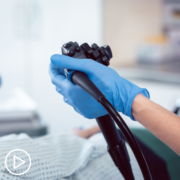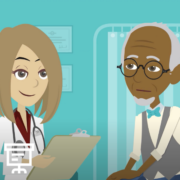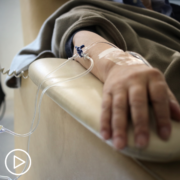See More From INSIST! AML
Related Resources:
Transcript:
Katherine:
Hello, and welcome. I’m Katherine Banwell. Today we’ll discuss the latest news from ASH 2020 and how AML patients can advocate for personalized care. Joining me is Dr. Jeffrey Lancet. Welcome. Would you please introduce yourself?
Dr. Lancet:
Hi, sure. My name is Dr. Jeff Lancet. I’m at the Moffitt Cancer Center in Tampa, Florida, where I am the Chair of the Malignant Hematology Department. We spend a lot of time treating patients and conducting clinical trials of Acute Myelogenous Leukemia.
Katherine:
Okay. Thank you. Dr. Lancet, the American Society of Hematology Annual Meeting just closed. What are the AML headlines from this year’s meeting?
Dr. Lancet:
Yeah, so as usual, AML was a very busy area for clinical presentations this year at the ASH meeting focusing largely on novel and targeted therapies.
I don’t believe that there were many practice changing developments per se, but rather discussions about many promising therapeutic strategies that are still under development and moving forward rapidly largely in the areas of targeted therapy, low intensity therapy, measurable residual disease and things of that nature.
Katherine:
What does this research news mean for patients?
Dr. Lancet:
Well, I think that there’s a lot to be encouraged about and maybe I’ll take the time to review some of the highlights in what was presented with respect to some of the novel therapeutic approaches that many of our patients can look forward to receiving in the not too distant future.
So, we often talk about you know, targeted therapies and, of course, one of the major targets over the years has been that of mutated FLT3 which is one of the most common mutations in AML.
And at this meeting we saw several presentations on clinical trials resolved to utilizing inhibitors of FLT3, with some emphasis on the most recently approved second generation drug called gilteritinib.
There were I thought three major presentations focusing on gilteritinib and one was an update on a randomized Phase III trial comparing gilteritinib plus azacitidine versus azacitidine alone in newly diagnosed unfit for induction chemotherapy patients with FLT3 mutations, preliminarily showing good tolerability and high composite complete response rates in the combination on.
There was another trial of gilteritinib plus venetoclax in relapsed and refractory FLT3 mutated AML.
And what was interesting was that a very high percentage of patients achieved response with this combination of gilteritinib plus venetoclax, many of whom were heavily pretreated previously and many of whom had also gotten prior FLT3 inhibitor therapy during an early stage of the disease. So, the combination of gilteritinib and venetoclax and this more refractive study, it was encouraging to see these promising responses.
And then we saw some data reporting the effects of gilteritinib in combination with more traditional chemotherapy induction with a couple of studies demonstrating both a high complete response rates as well as high rates of mutation clearance of the FLT3 mutation.
So, those were very encouraging data that were presented with respect to the FLT3 mutated AML population.
So, another very important drug that reached the marketplace for AML recently is a drug called venetoclax, which is an inhibitor of a protein called BCL2.
And this drug was recently FDA approved for use in combination with low intensity chemotherapy drugs such as azacitidine or decitabine.
And it seems as though the combination of venetoclax plus one of these hypomethylating agent drugs, azacitidine or decitabine has resulted in very, very strong efficacy signals as recently published in a New England Journal of Medicine paper that reported on the results of the Phase III trial of venetoclax plus azacitidine.
So, that has now become standard of care for older less fit adults with newly diagnosed AML; the combination of venetoclax plus a hypomethylating agent such as azacitidine.
And naturally, there’s been interest in really kind of taking it several steps further to advance the role of these combinations and to also look at additional drugs in combination with venetoclax plus hypomethylating agent therapy.
So, we saw some of that at the ASH meeting this year. One approach would be to take venetoclax and then to combine it with more intensive chemotherapy for perhaps more fit patients or younger patients that could undergo a more intensive program.
So, we saw presentations of venetoclax being combined with a drug called CPX-351, which is a novel liposome formulation of two common chemotherapy drugs that had been approved a few years ago for secondary AML. And we also saw a combination strategy with venetoclax, and a regimen known as FLAG-IDA, which is a commonly used induction regimen in acute myeloid leukemia.
And I think it’s important to recognize that although these trials that combine the venetoclax with more intensive chemotherapy showed signs of good efficacy with good response rates, there were definitely signals of increased toxicity, hematologic toxicity primarily, which is not completely unexpected with venetoclax knowing that it can cause significant lowering of white blood cells and platelets and hemoglobin.
And then finally, there is a lot of interest in, you know, doing these types of combinations with venetoclax in different subsets of AML and one subset of AML that has been very important recently is that of the IDH mutated AML population of patients.
IDH is a fairly common mutation that occurs either in the Isoform of IDH1 or IDH2 and there’s about a 15 to 20 percent incidence of IDH mutations in AML.
Now we do have an inhibitor for both of these types of mutations: ivosidenib for IDH1 and enasidenib for IDH2, but there also appears to be a strong role for venetoclax plus azacitidine in IDH mutated AML.
We saw from a series of patients presented by a physician at MD Anderson looking at outcomes with venetoclax plus azacitidine in IDH mutated AML. And the response rates were very high when you give HMA plus venetoclax to these patients with IDH mutated AML.
But I think more importantly was that there were what we call high intro patient response rates when switching between venetoclax and HMA therapy with an IDH inhibitor containing regimen.
In other words, a patient would have a good chance of responding to the initial therapy and then if or when that therapy stops working, having a good effect from a salvage therapy with the other regimen. So, when you see initially azacitidine plus venetoclax and then had a relapse, the IDH inhibitors worked well and vice versa if you had received an IDH inhibitor and then subsequently received HMA-venetoclax at a later time point that also worked well.
So, it’s encouraging to see that you can potentially sequence these drugs and get continued responses along the way and ultimately we think will help a survivor and keep patients in a better state of health even longer.
So, I just wanted to take a few minutes also and discuss some of the newer more novel therapies that are really hitting or approaching the landscape right now. One of these is called CC486, also known as oral azacitidine or ONUREG. And this drug was shown in recent literature to prolong overall survival in patients who are in first remission from their AML who had received induction chemotherapy.
So, this drug was used as maintenance therapy after a variable number of consolidation regimens. And people who got this ONUREG or oral azacitidine drug as maintenance therapy, it resulted in longer survival compared to those who had received placebo.
And this was presented at last year’s ASH meeting, but this year’s ASH meeting provided an update, a very important update, showing that the overall survival advantage from this drug, this oral azacitidine drug, when used as maintenance was independent of whether a patient had measurable residual disease at the time that they went onto the maintenance therapy.
In other words, whether you had MRD, measurable residual disease or not at the time of the study entry, your responses were still more favorable, your outcomes were more favorable, if you received this oral azacitidine drug.
So, this was FDA approved earlier this year for patients in the maintenance phase of therapy for AML who had gotten prior reduction chemotherapy.
And importantly, this drug was also shown to be able to convert about 25% of patients who were positive for measurable residual disease; convert them from positive to negative. So, even though they were in remission, they had measurable residual disease and this drug in about 25 percent of the cases converted that from positive to negative. So, that’s a very important finding as well.
Another important drug that I think you should keep your eye on is a drug called magrolimab. This is an antibody against a certain type of protein that is present on the immune system cell called the macrophage, and when this magrolimab drug was combined with azacitidine in a recent clinical trial, it was demonstrated very high response rates of over 65 percent.
And, in particular, in patients with P53 mutations, which is a very bad mutation to have in most cancers, including AML, in patients with this high-risk mutation, the combination of magrolimab with azacitidine appears to be effective based upon the early data that we have with high response rates.
And then finally, I just wanted to make mention of another important area in, not really just AML, but in all cancer and that’s outcomes disparities between different races and ethnic groups. And we saw a very important presentation at the plenary session this year where the authors reported outcomes amongst younger patients with AML who were African American compared with Caucasian.
And the data clearly indicated a worse overall survival amongst Black patients compared with white patients under age 60. And this included patients who were enrolled in clinical trials. So, that it appeared that African American patients have a worse outcome than Caucasian patients with acute myeloid leukemia highlighting the need to better understand various risk factors and other factors that play into these disparate outcomes between our Black American population and a white American population, which I think could shed light on additional disease characteristics that may help everybody as well.









